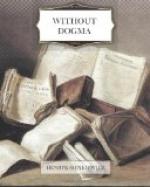“I beg of you, Pan Chwastowski, not to take the Lord’s name in vain.”
“I do not look under His snow, therefore do not offend Him.”
“Do you mean to insinuate that I do?”
“Most certainly.”
“Pan Chwastowski, you are unbearable.”
“Oho! bearable enough because he bears a great deal.”
In this or that way the screw goes round. There is scarcely a meal but they have some differences. Then my aunt at last subsides, and seems to wreak the remnants of her anger on the dinner. She enjoys a hearty appetite. As the dinner goes on she gradually brightens up and recovers her usual spirits. After dinner, I offer my arm to Aniela’s mother, my aunt accepts Pan Chwastowski’s, and presently they sip their black coffee in peace and perfect amity. My aunt inquires after his sons, and he kisses her hands. I saw those sons of his when they were at the university, and I hear they are promising young men, but great radicals.
Aniela used to get frightened at first at these prandial disputes, until I gave her the clue to the real state of things. So now when the first signal of battle is given, she looks at me slyly from under those long lashes, and there is a little smile lurking in the corners of her mouth. She is so pretty then I feel tempted to take her in my arms. I have never met a woman with such delicate veins on her temples.
12 February.
Truly a metamorphosis of Ovidius on the earth and within me! The frost has gone, the fine weather vanished, and there is Egyptian darkness. I cannot describe it better than by saying the weather is foul. What an abominable climate! In Rome, at the worst, the sun shines at intervals half a dozen times a day; here lamps ought to be lit these two days. The black, heavy mist seems to permeate one’s thoughts, and paint them a uniform gray. My aunt and Pan Chwastowski were more intent than usual upon warfare. He maintained that my aunt, by not allowing the woods to be touched, causes the timber to spoil; my aunt replied that others did their best to cut down all the timber, and not a bit of forest would soon be left in the country. “I am getting old; let the trees grow old too.” This reminds me of the nobleman of vast possessions who only allowed as much land to be cultivated as to where the bark of his dog could be heard.
Aniela’s mother, without intending it, gave me to-day a bad quarter of an hour. Alone with me in the conservatory, she began telling me, with maternal boastfulness, that an acquaintance of mine, a certain Pan Kromitzki, had made overtures for Aniela’s hand.




